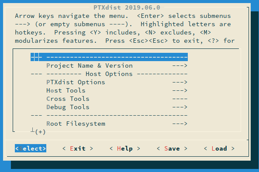PTXdist 2014.01.0
The PTXdist project has released version 2014.01.0 of the embedded linux build system:
The package templates for integrating self-written programs into a PTXdist BSP have been fixed. This mechanism lets you create a new set of build rules for packages with "simple" makefiles:
$ ptxdist newpacket src-make-prog
After answering a few questions, a template for the build rules and for the menu entries is created in rules/<packagename>.{in,make}
If the program does not already exist (i.e. when starting a new program), ptxdist creates a Makefile and hello-world file in local_src/<packagename>-<version>.
With this release, the mechanism above was fixed to do the right thing.
Recently, the lowpan-tools package has been added, which contains several utilities for using the 6LoWPAN IPv6-over-802.15.4 wireless communication stack on Linux.
The lowpan-tools package had dependency issues regarding python. With the current updates, python is now only a dependency if really necessary. This improves the build time.
Introduction of a "staging" area:
Some packages have been moved into the newly introduced "staging" area: acpid, upstart and mplayer. These packages do not compile any more, but they are currently not so important for the maintainer team that they have already spent the effort to reactivate them and fix the bugs.
This is something where we hope for the wider community: if you are interested in getting these packages back into ptxdist mainline, please help us and send patches.
Some help texts in the ptxdist menus and the toplevel helpfile have been improved and reflect the behaviour of the code in a better way now.
The automatically generated ptxdistrc has been synchronized with the current configuration.
The build rules for Valgrind, the memory leak debug tool, got improved error messages, so it should now be easier to get a working configuration.
rc-once is ptxdist's method of doing certain things on the first boot of a freshly installed embedded system, i.e. when a new SSH host key needs to be created.
With this release, the error handling for rc-once has been improved, so that the user gets booted into rescue mode when rc-once fails.
A lot of small patches have been added, which affects packages like glib, the icu-tools (for C++/Java unicode encoding), libsndfile and JVisu. The SQL database SQ-Lite got cross compiling improvements, and GStreamer does now build properly with Bison 3. Additionally, the host-xz tool has been improved regarding its shared library handling, and some unused files have been removed.
All in all, it was a quiet cycle, as most developers have been out for christmas holidays for the last weeks.
Further Readings
License management with the ptxdist make license-report
PTXdist comes with a tool to make license management more simple, namely the command: ptxdist make license-report. This tool generates a license report in pdf format, which filters the used BSP for all known licenses. To generate and comply with the license report should be seen as minimum standard, exceeding efforts should, if possible, be done.
Static Filesystem
Whenever it is a requirement to be able to switch off an embedded device without any previous preparation, the next question is about the consistence of the used filesystem. If this filesystem is used to be written with new content and this new/changed data hasn't done it's way to the persistent media when the power is cut, this new/changed data is lost.
Jump Start your BSP using DistroKit and PTXdist Layers
A BSP (Board Support Package) in Embedded Software is the layer of software that lets you run your application on a specific hardware. For Pengutronix a BSP usually contains a bootloader, Linux Kernel and a userspace. DistroKit is our Demo-BSP that supports a variety of common evaluation boards. DistroKit gives you a head start if you want to develop an application on top of such an evaluation board with most of the hard problems already solved.




